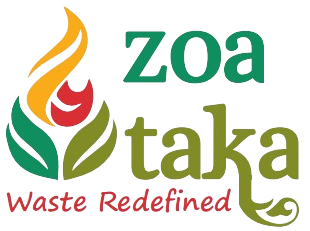We have deliberate guidelines
that helps our Teams in the process of waste management from
our Clients to the final disposal.
At Zoa Taka Ltd, we help businesses & households of all sizes find appropriate recycling solutions for all of their waste streams
in order to keep as much material out of dumpsites/landfills as possible and live by our mission to end waste – ZERO WASTE.
Waste Collection design and Sorting process
1.
Collection of Waste
With customized trucks, compactors and suitable equipment operated by a well trained professional team, waste is picked from our clients.
2.
Transportation to Yard
Waste is transported to our NEMA Compliant Materials Recovery Facility (MRF) for further processing
3.
Unloading at Yard
Unloading is systematically done according to the waste stream.
4.
Categorization
We conduct a waste categorization to bulk the different streams of waste for the sorting line.
5.
Sorting Process
The Sorting-line common fractions include:
- Organic Waste: Garden waste is used in Acacia Trees farming for organic honey productionwhile Food/Restaurant waste is used forblack soldier fly (BSF) farming used in animal feed production.
- Plastics: The various plastic wastes are upcycled for manufacturing new products or repurposing.
- Papers: Before we get into the recycling process, it’s important to note what type of paper products can be recycled at paper mills. These products include (but are not limited to):
• Cardboard/Carton/Brown paper
• Copy paper
• Envelopes
• Newspapers
• Phone books
• Notebooks
• Catalogs
• Magazines’
These are baled for paper millers to process further. - Metals: All metals such as aluminium, steel, copper etc are baled for metal smelters who recycle them into new various products.
6.
Residual Waste
Waste which cannot be reduced or diverted from disposal into recycling and organics collection programs is delivered to the County designated dumpsite.
Whereas Zoa Taka Ltd is committed to a ZERO WASTE goal, the reality is that the transition to a circular economy where materials and products are repurposed at the end-of-life and not disposed off, there is still some waste that is left after all reduction, recycling and composting options are exhausted.
The aim however is to eliminate and minimize all residual waste to the extent possible.

